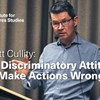impermissible

Garrett Cullity: How Discriminatory Attitudes Can Make Actions Wrong
Research seminar with Garrett Cullity, professor of philosophy at the Australian National University, known for his research on moral philosophy. Abstract In general, otherwise permissible actions do

Garrett Cullity: How Discriminatory Attitudes Can Make Actions Wrong
Research seminar with Garrett Cullity, professor of philosophy at the Australian National University, known for his research on moral philosophy. Abstract In general, otherwise permissible actions do
Garrett Cullity: But Thinking Makes It So: How Discriminatory Attitudes Can Make Actions Wrong
Research seminar with Garrett Cullity, professor of philosophy at the Australian National University, known for his research on moral philosophy. Venue: Holländargatan 13, Stockholm Register here > Ab
Katie Steele: The real paradox of supererogation
Katie Steele, Associate Professor, Australian National University. Abstract It is a feature of our ordinary moral talk that some acts are supererogatory, or beyond what is required. But ‘beyond’ in what
Nondeterminacy, cycles and rational choice
in: Analysis (2020) Volume 80:3. AbstractA notorious problem that has recently received increased attention in axiology, normative theory and population ethics is the apparent ubiquity of what can be g. This paper illustrates how nondeterminacy can spawn cyclical rankings. So, accepting that practical reasons can admit of nondeterminacy challenges the widely held idea that ‘better than’ is transitive. As a result, standard approaches to rational choice under nondeterminacy fail to be action-guiding, since in some situations all options are dominated, that is, impermissible according to standard rational choice criteria.
Authority and Coercion Beyond the State? The Limited Applicability of Legitimacy Standards for Extraterritorial Border Controls
Jus Cogens, vol. 6, p.141–160 Abstract Extraterritorial border controls prevent migrants from arriving at the territory of the state and effectively undermine rights to apply for asylum and protections
Review of Elizabeth Barnes, The Minority Body: Theory of Disability
Oxford: Oxford University Press, 2016, pp. 224, £25. Ratio. doi:10.1111/rati.12151 What does being disabled mean for the disabled individual’s life? Does being a disabled individual have inherent negatregarding disability.
Asymmetry and Non-Identity
Utilitas, Volume 31, Issue 3, pp.213-230. doi.org/10.1017/S0953820818000341 Abstract In this article we distinguish two versions of the non-identity problem: one involving positive well-being and one inv

Creating happy animals in order to eat them: Jeff McMahan and Tim Campbell
In recent debates about the ethics of eating animals, some have advanced the claim that if people cause animals to exist and give them good lives in order to be able to eat them, then even if the anim
Nondeterminacy, Two-Step Models, and Justified Choice
Ethics, Volume 129, no. 2, pp. 284-308. doi.org/10.1086/700032 Abstract This article analyzes approaches to nondeterminacy (e.g., incommensurability, indeterminacy, parity) that suggest that one can make








